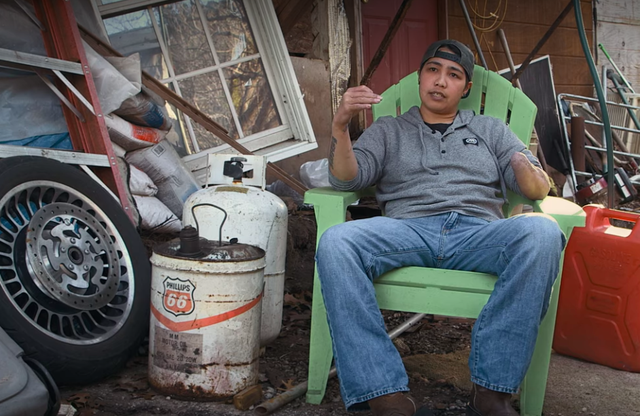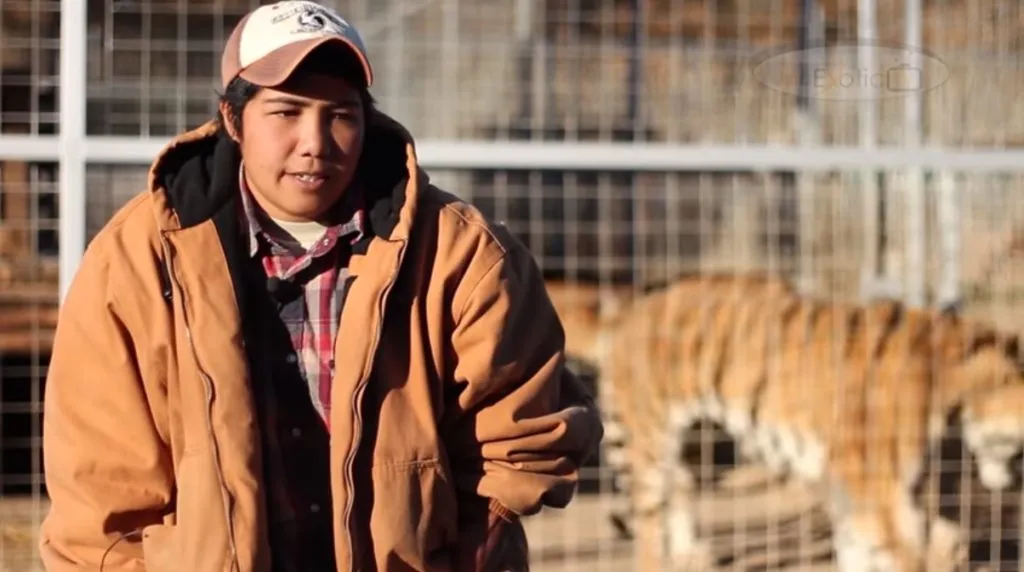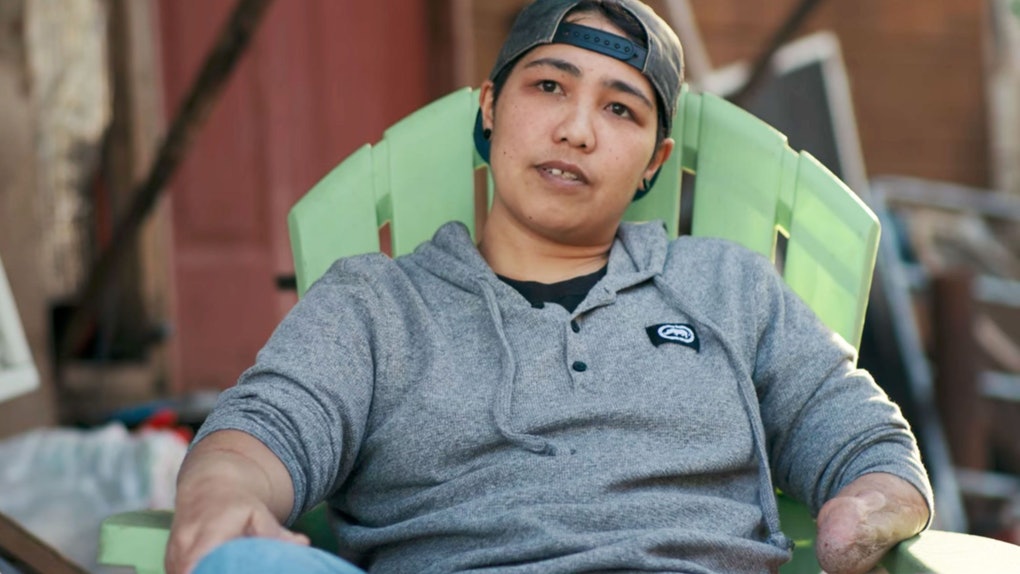Tiger King hero Saff on life after Netflix, standing behind the queer community and what Joe Exotic is really like

In the often cascading chaos of Tiger King: Murder, Mayehm and Madness, Saff Saffrey was a grounding voice. (Netflix)
Of all the shocks in the Tiger King series – and there were many – one of the most jaw-dropping, head-tilting moments was when Saff’s arm was torn off by a tiger.
Just as surprising was the revelation that despite his life-changing injury, he had continued on at the park. Forced to decide between two years of reconstructive surgeries or amputation, he chose the latter just so he could be with the big cats again, such was his dedication to the cause.
A soothing, even-tempered, thoroughly unbothered voice among the chaos, Saff was quickly hailed as the series’ hero and sole goody. Even after the show had aired and it emerged that Saff had been misgendered throughout, he simply said that was used to it, brushing off the outrage others felt on his behalf.
As he explained to PinkNews, his life at the Greater Wynnewood Exotic Animal Memorial Park “was awesome… so those details, even though to some may mean the world, to me, just did not”.
Hunkering down in his new California home, where the laughter of his children and the hum of his television set have replaced the growls and purrs of the big cats, he opened up about his hopes for the future, whether he feels part of the LGBT+ community, and how people’s perception of him as “honest” and “decent” are, in fact, pretty accurate.
PinkNews: Tiger King catapulted you into fame right in the middle a global pandemic. What have the last few months been like?
Saff: Everything’s new to me. Obviously, I’ve never been in any of these situations before. But I moved to the California Redlands, about an hour east of Los Angeles, at the beginning of 2020, so my life was pretty much in an uproar when this all happened.
The easiest way to describe how I am dealing with it is literally a day at a time. Everything changes every day and I’m just trying to be prepared for everything that comes my way.

Saff, featured in the Netflix documentary Tiger King. (Netflix)
What’s the biggest challenge been?
I’m not anonymous anymore. Doing very simple things – a grocery store or a gas station – kinda turns into a little bit of an event for me now.
That’s not a negative thing, but it’s definitely been a little challenging when 10-minute grocery store run turns into a two-hour meeting.
Overall, it’s a wonderful experience. I just feel blessed. I really feel blessed and humbled.
You have three kids – what’s it been like for them now that dad’s famous?
I don’t know if they really comprehend at all. I think the oldest does. But none of them seems to show, obviously. So it’s really just when we’re in public they know that people are going to approach me.
I actually just took them to an event I went to as my first scheduled public appearance. That was exciting for the entire family, I love being able to share it with them. It’s what life is about.
A lot of folks watching Tiger King described you as the only good person on the show. Do you feel that the show’s depiction of you – and the rest of the cast – was accurate?
Yes, definitely! As far as our personalities and characteristics, yes, that was pretty spot on.
But there’s always more to every person’s story. What is shown within a few hours, that’s just wrapped up in a nutshell. On my behalf, there’s so much more to me than what you guys saw on camera. I have made my mistakes and I’ve had my struggles and my hardships.
What you guys saw, that was Joe Exotic at his finest.
I know everyone personally, so I can say this, I know that there’s so much more to everyone’s story. Take Joe. What you guys saw, that was Joe Exotic at his finest. But there are a lot of things that were not shown.
He used to put on these beautiful dinners every single Thanksgiving at the farm for people to come and have a hot, wonderful home-cooked Thanksgiving meal for free.
What were people’s attitudes like at the park in terms of your gender identity? I know you’ve spoken out about being misgendered but I’m curious to know how you were actually treated there as a trans person?
I always felt at home and I always felt comfortable there. I don’t think that it was brought up, or if it was happening around me, I don’t think I ever paid any attention.
I can’t explain how consumed I was by the fact that I got to walk amongst tigers. I got to wake up and instead of putting on a suit, I threw on my clothes and jumped in the cage with them.
My life was awesome, so those details, even though to some may mean the world, to me, it just did not.
What I did with those animals was all that mattered. And that’s all I got.
You’ve told interviewers before that you don’t identify as transgender. Do you feel part of the LGBT+ community?
I don’t know that I ever really thought on it before this. But absolutely.
I think that the LGBT+ community stands for being yourself: How you feel, how you love yourself, how you view yourself and being able to be proud of that in any environment in with any audience.
I think that’s what that community stands for, and I definitely stand behind that.
Did you celebrate Pride Month this year?
I don’t like participating in things or even being involved in things if I am uneducated on it, or if I don’t know really know everything about it. But I mean, things like that – it takes nothing, it takes no energy, to be able to contribute to something and this goes for anything.
This goes for Black Lives Matter, or GLAAD and Pride month, or when COVID was first happening… we had so many COVID-19 relief funds that I participated in just to do my tiny part.
I think every American, every person in the world, if they did their small thing, it would make a huge difference because power in numbers is a real thing.
What are you most looking forward to? What what do you want to share more with your loved ones?
I’ve thought of so many things, because I do want to make sure that I’m making the most of what I’ve been offered, which is a platform. Not many people get offered this in a lifetime.
I want to make sure that I use that platform not only for something that I’m passionate about, but for something that I can be proud of, that my kids and my family can be proud of.
I’m still thinking about it, but I know that I want it to involve animals. I’ve only known exotic animals in captivity. I want to be able to see them in the wild, which I have not been able to, up until this point in my life.
I want to turn that something I can implement, back into teaching or even just educating people on both sides so that the decisions that are made, especially here in America with the exotic animal industry, are from a more educated standpoint. It’s hard to speak on the other side if you don’t really know. I would love to know.

Saff, featured in the Netflix documentary Tiger King. (Netflix)
You’ve spoken about before how you quit the zoo and went into a more clock-in, clock-out kind of job. Do you miss the animals?
I miss them every single day. I miss the work that I used to do with them – being in their presence because that was a blessing in itself. But I think that when I was focused on these animals, it was with only me in consideration.
My life has always been private, and what people don’t know is that in living that dream, being able to work with these animals as often and as much as I did, I didn’t have much of the family life. The people that I cared about, the people that mean the most to me, were kind of put on the back-burner.
Now that I am able to pull them to where they belong in that priority seat.
If you could go back to the time when you worked at the zoo and you lost your arm, is there anything you do differently?
I don’t know if I would have done anything differently. The way that I worked with those animals as far as protocols and whatnot was second nature. And that, in the end, was my demise. That is what ended up me losing my left hand.
I do miss my hand sometimes. There are days where I’m like: “Man, how can I’ve been so stupid? Why couldn’t I just paid a little bit more attention?”
But I don’t know if I can genuinely say I would do anything differently. I think I just kind of take what I have done the best I can.
Finally, you recently filmed your first-ever commercial for lawyer Bader Scott to raise awareness about how impactful personal injuries at work can be. What has that experience been like for you?
It was surreal. You know, every single time, no matter how many times I hear my story over and over whether from myself or from someone else, every time I hear it, I’m just like: “Man, that’s incredible. That’s not a story, you hear every day.”
So, as much as it moves me still to this day, seven years later, I know that every single person that hears it, it will get their attention. I’m not saying that to captivate them, but it will get their attention and I think that’s all that matters.
Every single thing that has happened to me since [Tiger King] has come out has been positive has been significant and has been absolutely important.

